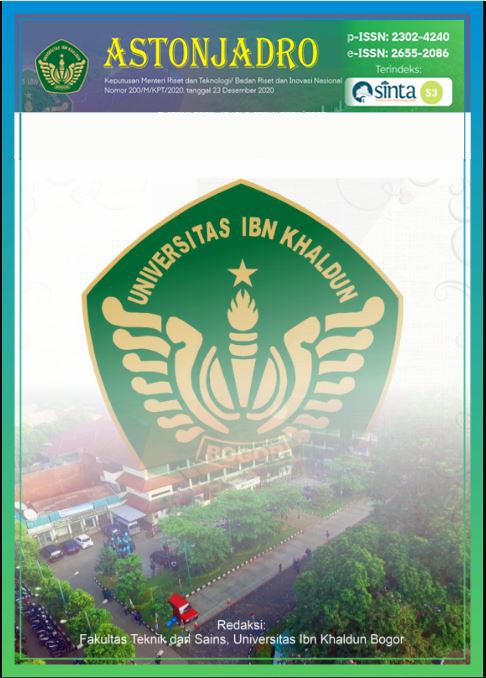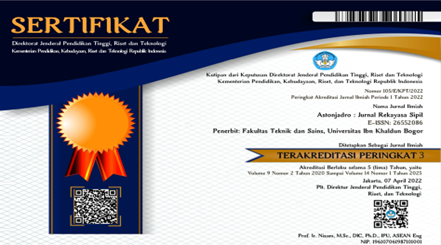Investigation and Analysis of People Preferences in Choosing Public Transportation During COVID-19 Pandemic: Statistical Approach and Case Study in Malang City
DOI:
https://doi.org/10.32832/astonjadro.v12i3.13784Keywords:
public transportation, COVID-19 pandemic, SPSS analysis, preferences, statistical modelingAbstract
The transportation condition in Malang City during COVID-19 pandemic has been the subject of this research, with one study proposing to support information about public transportation services in the city. This policy encourages people to participate in activities such as working from home and school during the COVID-19 pandemic. Another concern is that the availability of public transportation facilities is being limited by a lack of conventional transportation as result of this policy. The greatest impact on this variable is the appropriateness of the price, as customers of the service are typically users on a daily basis. Online transportation is considered more effective in terms of distance because there is a mapping application or location that is provided by service providers or drivers in specific areas. The coefficient of determination is a statistical measure used to evaluate the accuracy of a model in predicting future outcomes. The model is generally accurate because all of the variables are significant and have a direct effect on the dependent variables. The F-test value associated with the coefficient was 33.927, and the level of significance was >0.0001. The following describes the results of the t-test regarding the effect of variables on variables: Reliability The value of the t-count is 2.358 > 1.68, and the significance value is 0.013 < 0.05. Responsiveness The t-count of 9.513 is greater than 1.68, and the associated significance level is 0.0001 which is less than 0.05.References
Chen, Y., Corr, D. J., & Durango-Cohen, P. L. (2014). Analysis of common-cause and special-cause variation in the deterioration of transportation infrastructure: A field application of statistical process control for structural health monitoring. Transportation Research Part B: Methodological, 59, 96–116. https://doi.org/10.1016/j.trb.2013.11.002
Dalanta, F., Kusworo, T. D., Aryanti, N., & Othman, N. H. (2021). Optimization of AC/TiO2/CeO2 composite formulation for petroleum refinery wastewater treatment via simultaneous adsorption-photocatalytic process using D-optimal mixture experimental design. Journal of Environmental Chemical Engineering, 9(6), 106517. https://doi.org/10.1016/J.JECE.2021.106517
Delclòs-Alió, X., Gutiérrez, A., Miravet, D., Tomàs-Porres, J., Vich, G., & Clavé, S. A. (2022). Impact of the COVID-19 pandemic on tourist public transportation use and on its determinants: Evidence from a Catalan coastal destination. Tourism Management Perspectives, 44, 101003. https://doi.org/10.1016/j.tmp.2022.101003
Deveci, M., Pamucar, D., Gokasar, I., Delen, D., & Martínez, L. (2022). A fuzzy Einstein-based decision support system for public transportation management at times of pandemic. Knowledge-Based Systems, 252, 109414. https://doi.org/10.1016/j.knosys.2022.109414
Dirgahayani, P. (2013). Environmental co-benefits of public transportation improvement initiative: the case of Trans-Jogja bus system in Yogyakarta, Indonesia. Journal of Cleaner Production, 58, 74–81. https://doi.org/10.1016/j.jclepro.2013.07.013
Ekawati, F. M., Muchlis, M., Ghislaine Iturrieta-Guaita, N., & Astuti Dharma Putri, D. (2023). Recommendations for improving maternal health services in Indonesian primary care under the COVID-19 pandemic: Results of a systematic review and appraisal of international guidelines. Sexual & Reproductive Healthcare, 35, 100811. https://doi.org/10.1016/j.srhc.2023.100811
Guerrieri, M., & Parla, G. (2022). Real-time social distance measurement and face mask detection in public transportation systems during the COVID-19 pandemic and post-pandemic Era: Theoretical approach and case study in Italy. Transportation Research Interdisciplinary Perspectives, 16, 100693. https://doi.org/10.1016/j.trip.2022.100693
Hartantri, Y., Debora, J., Widyatmoko, L., Giwangkancana, G., Suryadinata, H., Susandi, E., Hutajulu, E., Hakiman, A. P. A., Pusparini, Y., & Alisjahbana, B. (2023). Clinical and treatment factors associated with the mortality of COVID-19 patients admitted to a referral hospital in Indonesia. The Lancet Regional Health - Southeast Asia, 11, 100167. https://doi.org/10.1016/j.lansea.2023.100167
Ilbeigi, M. (2019). Statistical process control for analyzing resilience of transportation networks. International Journal of Disaster Risk Reduction, 33, 155–161. https://doi.org/10.1016/j.ijdrr.2018.10.002
Levashev, A., Pavlova, O., Sokolova, N., & Chelpanova, I. (2023). Principles of Allocation of Special Transportation Analysis Zones. Transportation Research Procedia, 68, 876–883. https://doi.org/10.1016/j.trpro.2023.02.124
Li, Z., Lu, D., & Gao, X. (2021). Optimization of mixture proportions by statistical experimental design using response surface method - A review. In Journal of Building Engineering (Vol. 36, p. 102101). Elsevier Ltd. https://doi.org/10.1016/j.jobe.2020.102101
Nasseri, M. (2018). Book review. System, 72, 241–243. https://doi.org/10.1016/j.system.2017.12.008
Paikun, P., Faris, W., & Rozandi, A. (2021). TRAFFIC ACCIDENT POINT ANALYSIS, ON PRIMARY ARTERIAL ROAD-SUKABUMI DISTRICT. Astonjadro, 10(2), 237. https://doi.org/10.32832/astonjadro.v10i2.4842
Pan, M. (Melrose), & Ryan, A. (2022). Investigating confirmation bias in transportation: An analysis of perceived health risk on public transit during the pandemic. Journal of Transport & Health, 26, 101485. https://doi.org/10.1016/j.jth.2022.101485
Pratama, A. B., Amber, H., Shershunovich, Y., & Castro, A. B. R. de. (2023). Do smart cities perform better in governing the COVID-19 crisis? Empirical evidence from Indonesian cities. Urban Governance. https://doi.org/10.1016/j.ugj.2023.02.003
Purwanto, P., Astuti, I. S., Rohman, F., Utomo, K. S. B., & Aldianto, Y. E. (2022). Assessment of the dynamics of urban surface temperatures and air pollution related to COVID-19 in a densely populated City environment in East Java. Ecological Informatics, 71, 101809. https://doi.org/10.1016/j.ecoinf.2022.101809
Rakhmatulloh, A. R., Dewi, D. I. K., & Andini, T. (2021). ROUTE INTEGRATION OF SEMARANG TRANS FEEDER for THE CITY OF SEMARANG AND SURROUNDINGS. Astonjadro, 10(2), 249. https://doi.org/10.32832/astonjadro.v10i2.4850
Šebjan, U., & Tominc, P. (2015). Impact of support of teacher and compatibility with needs of study on usefulness of SPSS by students. Computers in Human Behavior, 53, 354–365. https://doi.org/10.1016/j.chb.2015.07.022
Shabani, A., Shabani, A., Ahmadinejad, B., & Salmasnia, A. (2022). Measuring the customer satisfaction of public transportation in Tehran during the COVID-19 pandemic using MCDM techniques. Case Studies on Transport Policy, 10(3), 1520–1530. https://doi.org/10.1016/j.cstp.2022.05.009
Shao, S., Xu, G., & Li, M. (2019). The design of an IoT-based route optimization system: A smart product-service system (SPSS) approach. Advanced Engineering Informatics, 42, 101006. https://doi.org/10.1016/j.aei.2019.101006
Sherry, L., & Wang, C. (2022). A Statistical Overview of Fixed Wing Air Medical Transportation Operations in the United States (2019-2020). Air Medical Journal, 41(4), 359–369. https://doi.org/10.1016/j.amj.2022.04.011
Shvetsov, A. V., Dronichev, A. V., Kuzmina, N. A., & Shvetsova, S. V. (2023). Analysis and Systematization of the Functions of Participants in the Process of Ensuring Transportation Security. Transportation Research Procedia, 68, 573–578. https://doi.org/10.1016/j.trpro.2023.02.078
Silva, L. J., Panzera, T. H., Velloso, V. R., Rubio, J. C. C., Christoforo, A. L., & Scarpa, F. (2013). Statistical design of polymeric composites reinforced with banana fibres and silica microparticles. Journal of Composite Materials, 47(10), 1199–1210. https://doi.org/10.1177/0021998312446499
Silviana, S., Darmawan, A., Subagio, A., & Dalanta, F. (2019). Statistical approaching for superhydrophobic coating preparation using silica derived from geothermal solid waste. ASEAN Journal of Chemical Engineering, 19(2), 91–99. https://doi.org/10.22146/ajche.51178
Singh, V., Singh, T., Higueras-Castillo, E., & Liebana-Cabanillas, F. J. (2023). Sustainable road transportation adoption research: A meta and weight analysis, and moderation analysis. Journal of Cleaner Production, 392, 136276. https://doi.org/10.1016/j.jclepro.2023.136276
Siregar, J. P. (2014). Assessment of Public Space Quality Using Good Public Space Index (Case Study of Merjosari Sub District, Municipality of Malang, Indonesia). Procedia - Social and Behavioral Sciences, 135, 10–17. https://doi.org/10.1016/j.sbspro.2014.07.318
Suryani, E., Hendrawan, R. A., Eka Adipraja, P. F., Widodo, B., Rahmawati, U. E., & Chou, S.-Y. (2022). Dynamic scenario to mitigate carbon emissions of transportation system: A system thinking approach. Procedia Computer Science, 197, 635–641. https://doi.org/10.1016/j.procs.2021.12.184
Wirastri, M. V., Morrison, N., & Paine, G. (2023). The connection between slums and COVID-19 cases in Jakarta, Indonesia: A case study of Kapuk Urban Village. Habitat International, 134, 102765. https://doi.org/10.1016/j.habitatint.2023.102765
Zhang, H., Zhou, B.-B., Liu, S., Hu, G., Meng, X., Liu, X., Shi, H., Gao, Y., Hou, H., & Li, X. (2023). Enhancing intercity transportation will improve the equitable distribution of high-quality health care in China. Applied Geography, 152, 102892. https://doi.org/10.1016/j.apgeog.2023.102892.
Downloads
Published
How to Cite
Issue
Section
License
Copyright (c) 2023 ASTONJADRO

This work is licensed under a Creative Commons Attribution-ShareAlike 4.0 International License.
Paper submitted to ASTONJADRO is the sole property of the Astonjadro Journal. Unless the author withdraws the paper because he does not want to be published in this journal. The publication rights are in the journal Astonjadro.ASTONJADRO
LICENSE
This work is licensed under a Creative Commons Attribution-ShareAlike 4.0 International License.
Based on a work at http://ejournal.uika-bogor.ac.id/index.php/ASTONJADRO













